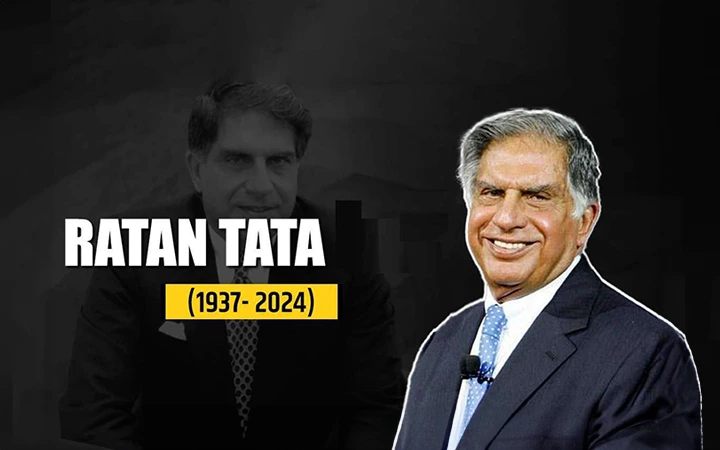Ratan Tata, the beloved industrialist and philanthropist, passed away on Wednesday, at the age of 86, in a Mumbai hospital. His body will lie in state at the National Centre for Performing Arts (NCPA) in Mumbai’s Nariman Point today from 10 am to 4 pm, allowing the public to pay their final respects. The Maharashtra Chief Minister Eknath Shinde has declared a day of mourning, and the national flag will be flown at half-mast across government offices in the state as a tribute to Tata’s monumental contributions to India. The cremation is set to occur later today in the Worli area. Notably, Home Minister Amit Shah will be present at the ceremony, while Prime Minister Narendra Modi is attending the ASEAN-India and East Asia summits in Laos.
Ratan Tata’s passing signifies the end of an era in Indian business, where he played a pivotal role in transforming the country’s industrial landscape and elevating his family-owned Tata Group into a global powerhouse. Despite leading over 30 companies across more than 100 countries, Tata lived a life of humility, never seeking personal accolades or appearing on billionaire lists. Instead, he exemplified quiet integrity and decency throughout his life and career.
Born on December 28, 1937, in Mumbai, Ratan Tata belonged to one of India’s most esteemed business families. He was the great-grandson of Jamsetji Tata, the visionary founder of the Tata Group, which began as a modest trading company in 1868 and evolved into a conglomerate with diverse interests spanning steel, salt, automobiles, software, and airlines.
Tata’s early years were marked by both privilege and challenges, as he was raised by his grandmother, Lady Navajbai Tata, following his parents’ separation. He attended the prestigious Cathedral and John Connon School in Mumbai before pursuing higher education in the United States. Tata graduated with a Bachelor of Science degree in Architecture from Cornell University in 1962. He later completed the Advanced Management Program at Harvard Business School. However, his aspirations to become an architect shifted when he returned to India in the early 1960s to join the family business, starting his career on the shop floor of Tata Steel’s Jamshedpur plant.
In 1971, Tata took charge of National Radio and Electronics Company (Nelco), a struggling subsidiary of the Tata Group. Despite his efforts, he was unable to turn the company’s fortunes around in the challenging economic climate of the 1970s. However, in 1991, Ratan Tata succeeded his legendary uncle J.R.D. Tata as chairman of the Tata Group, a role that came with significant skepticism from both within and outside the organization. Nevertheless, he quickly proved his critics wrong.
The year 1991 was transformative for India, marking the beginning of economic liberalization and a shift away from protectionist policies. Tata seized this pivotal moment to lead the Tata Group into a new era of global expansion, technological innovation, and modern management practices. One of his early milestones was the $431.3 million acquisition of the British tea company Tetley in 2000, which marked the group’s first significant international foray.
Tata’s ambition continued to grow as he orchestrated the acquisition of Daewoo Motors’ truck manufacturing operations in South Korea for $102 million in 2004. The crowning achievement of his leadership was the $11.3 billion acquisition of the Anglo-Dutch steel company Corus Group in 2007, a landmark deal that positioned Tata Steel as the fifth-largest steelmaker in the world.
In 2008, Tata Motors made headlines again with the acquisition of the iconic British luxury car brands Jaguar and Land Rover (JLR) from Ford Motor Company for $2.3 billion. Initially struggling, JLR thrived under Tata’s guidance, becoming one of the most profitable divisions of the Tata Group. Another significant project was the launch of the Tata Nano in 2008, aimed at making car ownership accessible to millions of Indians. Priced at just ₹1 lakh, it was celebrated as “the people’s car.”
Ratan Tata was not only a titan in business but also revered for his philanthropic endeavors. His charitable initiatives were largely channeled through the Tata Trusts, established by his great-grandfather Jamsetji Tata. These trusts control a majority of the shares in Tata Sons, the holding company of the Tata Group, ensuring that a significant portion of the company’s wealth is utilized for social good.
After taking over the Tata Group in 1991, Tata was instrumental in acquiring international firms like Corus and Jaguar Land Rover, significantly expanding the conglomerate’s reach across various sectors, including steel, automotive, and information technology. A recipient of the Padma Vibhushan, Tata retired in 2012 but continued to play an active role in mentoring young entrepreneurs and investing in start-ups through his investment firm, RNT Capital Advisors.
His death has elicited an outpouring of grief across the nation. Prime Minister Narendra Modi honored Tata as a “visionary business leader” and “compassionate soul,” while business magnates like Gautam Adani, Anand Mahindra, and Sundar Pichai have also expressed their condolences.
In his passing, Ratan Tata leaves behind a legacy of innovation, integrity, and compassion, inspiring future generations to follow in his footsteps.

